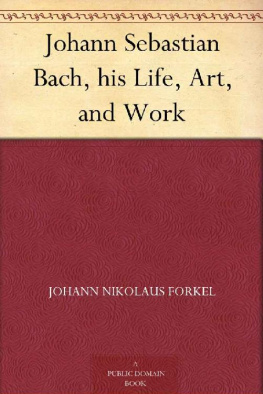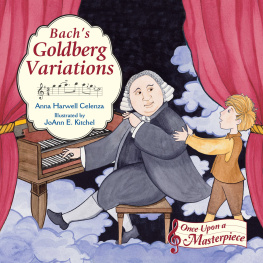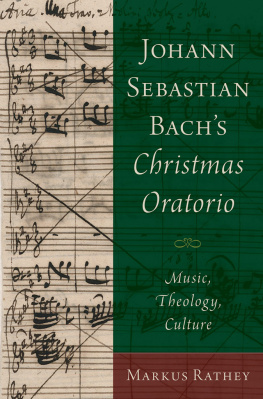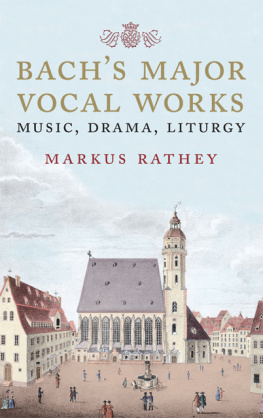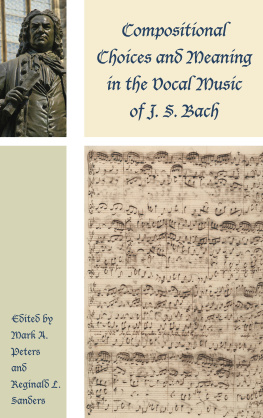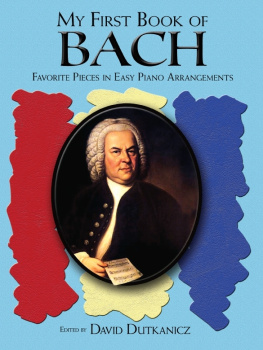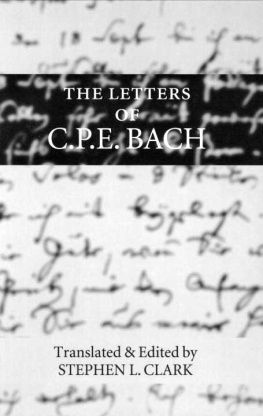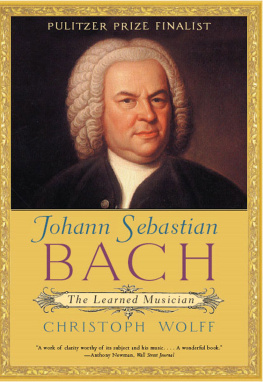Introduction
[pg ix]
Johann Nikolaus Forkel, author of the monograph of which the following pages afford a translation, was born at Meeder, a small village in Saxe-Coburg, on February 22, 1749, seventeen months before the death of Johann Sebastian Bach, whose first biographer he became. Presumably he would have followed the craft of his father, the village shoemaker, had not an insatiable love of music seized him in early years. He obtained books, and studied them with the village schoolmaster. In particular he profited by the Vollkommener Kapellmeister of Johann Mattheson, of Hamburg, the sometime friend of Handel. Like Handel, he found a derelict Clavier in the attic of his home and acquired proficiency upon it. Forkel's professional career, like Bach's half a century earlier, began at Lneburg, where, at the age of thirteen (1762), he was admitted to the choir of the parish church. Thence, at the age of seventeen (1766), he proceeded to Schwerin as Chorprfect, and enjoyed the favour of the Grand Duke. Three years later he betook himself (1769), at the age of twenty, to the University [pg x] of Gttingen, which he entered as a law student, though a slender purse compelled him to give music lessons for a livelihood. He used his opportunity to acquire a knowledge of modern languages, which stood him in good stead later, when his researches required him to explore foreign literatures. Concurrently he pursued his musical activities, and in 1774 published at Gttingen his first work, Ueber die Theorie der Musik, advocating the foundation of a music lectureship in the University. Four years later (1778) he was appointed its Director of Music, and from 1779 to 1815 conducted the weekly concerts of the Sing-Akademie. In 1780 he received from the University the doctorate of philosophy. The rest of his life was spent at Gttingen, where he died on March 17, 1818, having just completed his sixty-ninth year.
That Forkel is remembered at all is due solely to his monograph on Bach. Written at a time when Bach's greatness was realised in hardly any quarter, the book claimed for him pre-eminence which a tardily enlightened world since has conceded him. By his generation Forkel was esteemed chiefly for his literary activity, critical ability, and merit as a composer. His principal work, Allgemeine Geschichte der Musik, was published in two volumes at Leipzig in 1788 and 1801. Carl Friedrich Zelter, Goethe's friend and correspondent, dismissed the book contemptuously as that of [pg xi] an author who had set out to write a history of music, but came to an end just where the history of music begins. Forkel's work, in fact, breaks off at the sixteenth century. But the curtailed History cleared the way for the monograph on Bach, a more valuable contribution to the literature of music. Forkel already had published, in three volumes, at Gotha in 1778, his Musikalisch-kritische Bibliothek, and in 1792 completed his critical studies by publishing at Leipzig his Allgemeine Literatur der Musik.
Forkel was also a student of the music of the polyphonic school. He prepared for the press the scores of a number of sixteenth century Masses, Motets, etc., and fortunately received proofs of them from the engraver. For, in 1806, after the Battle of Jena, the French impounded the plates and melted them down. Forkel's proofs are still preserved in the Berlin Royal Library. He was diligent in quest of Bach's scattered MSS., and his friendship with Bach's elder sons, Carl Philipp Emmanuel and Wilhelm Friedemann, enabled him to secure precious relics which otherwise might have shared the fate of too many of Bach's manuscripts. He took an active interest in the proposal of Messrs. Hoffmeister and Khnel, predecessors of C. F. Peters at Leipzig, to print a kritisch-korrecte edition of Bach's Organ and Clavier works. Through his friend, Johann Gottfried Schicht, afterwards Cantor at St. Thomas's, [pg xii] Leipzig, he was also associated with Breitkopf and Haertel's publication of five of Bach's six extant Motets in 1802-3.
As a composer Forkel has long ceased to be remembered. His works include two Oratorios, Hiskias (1789) and Die Hirten bey der Krippe ; four Cantatas for chorus and orchestra; Clavier Concertos, and many Sonatas and Variations for the Harpsichord.
In 1802, for reasons which he explains in his Preface, Forkel published from Hoffmeister and Khnel's Bureau de Musique his Ueber Johann Sebastian Bachs Leben, Kunst und Kunstwerke. Fr patriotische Verehrer echter musikalischer Kunst, of which a new edition was issued by Peters in 1856. The original edition bears a dedication to Gottfried Baron van Swieten (1734-1803), Prefect of the Royal Library, Vienna, and sometime Austrian Ambassador in Berlin, a friend of Haydn and Mozart, patron of Beethoven, a man whose age allowed him to have seen Bach, and whose career makes the association with Bach that Forkel's dedication gives him not undeserved. It was he, an ardent Bach enthusiast, who introduced the youthful Mozart to the music of the Leipzig Cantor. I go every Sunday at twelve o'clock to the Baron van Swieten, Mozart writes in 1782, where nothing is played but Handel and [pg xiii] Bach, and I am now making a collection of the Fugues of Bach. The merit and limitations of Forkel's book will be considered later. For the moment the fact deserves emphasis that, inadequate as it is, it presented a fuller picture of Bach than so far had been drawn, and was the first to render the homage due to his genius.
In an illuminating chapter (xii.), Death and Resurrection , Schweitzer has told the story of the neglect that obscured Bach's memory after his death in 1750. Isolated voices, raised here and there, acclaimed his genius. With Bach's treatise on The Art of Fugue before him, Johann Mattheson (1681-1664), the foremost critic of the day, claimed that Germany was the true home of Organ music and Fugue. Friedrich Wilhelm Marpurg (1718-95), the famous Berlin theorist, expressed the same opinion in his preface to the edition of that work published shortly after Bach's death. But such appreciations were rare. Little of Bach's music was in print and available for performance or critical judgment. Even at St. Thomas's, Leipzig, it suffered almost complete neglect until a generation after Forkel's death. The bulk of Bach's MSS. was divided among his family, and Forkel himself, with unrivalled opportunity to acquaint himself with the dimensions of Bach's industry, knew little of his music except the Organ and Clavier compositions.
[pg xiv]
In these circumstances it is not strange that Bach's memory waited for more than half a century for a biographer. Forkel, however, was not the first to assemble the known facts of Bach's career or to assert his place in the music of Germany.
Putting aside Johann Gottfried Walther's brief epitome in his Lexikon (1732), the first and most important of the early notices of Bach was the obituary article, or Nekrolog, contributed by his son, Carl Philipp Emmanuel, and Johann Friedrich Agricola, one of Bach's most distinguished pupils, to the fourth volume of Mizler's Musikalische Bibliothek, published at Leipzig in 1754. The authors of this appreciation give it an intimacy which renders it precious. But Mizler's periodical was the organ of a small Society, of which Bach had been a member, and outside its associates can have done little to extend a knowledge of the subject of the memoir.
Johann Friedrich Agricola contributed notes on Bach to Jakob Adlung's Musica mechanica Organoedi, published in two volumes at Berlin in 1768. The article is valuable chiefly for Agricola's exposition of Bach's opinions upon Organ and Clavier building.

